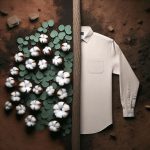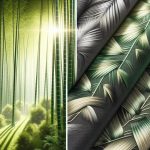Tencel Lyocell Fiberfill is a soft, breathable, and eco-friendly stuffing made from sustainably sourced eucalyptus wood pulp. You’ll enjoy its natural moisture-wicking and hypoallergenic qualities, perfect for comfort and sensitive skin. This fiber uses a closed-loop process that recycles water and solvents, minimizing environmental impact. Unlike synthetic fillings, it’s biodegradable and helps reduce waste. If you want to discover how this sustainable fiberfill compares to others and how to care for it, keep exploring the details.
Table of Contents
Key Takeaways
- Tencel Lyocell Fiberfill is made from sustainably sourced eucalyptus wood pulp using an eco-friendly closed-loop manufacturing process.
- It is biodegradable, hypoallergenic, highly breathable, and effectively wicks moisture to keep users dry and comfortable.
- Compared to synthetics, it offers better temperature regulation and is a renewable, eco-conscious alternative to petroleum-based fillings.
- Commonly used in pillows, comforters, jackets, and stuffed toys, it combines softness, durability, and environmental responsibility.
- Care involves gentle machine washing, avoiding harsh chemicals, and thorough drying to prevent mildew and maintain loft.
Understanding the Origins of Tencel Lyocell Fiberfill
Although you mightn’t realize it, Tencel Lyocell fiberfill starts its journey from sustainably managed eucalyptus forests. These trees grow quickly and require minimal water, making them an eco-friendly raw material.
When you choose products stuffed with Tencel Lyocell, you’re supporting a renewable resource that’s carefully harvested to protect biodiversity and soil quality. The forests are certified by organizations like FSC or PEFC, ensuring sustainability throughout the supply chain.
Because the wood comes from responsibly managed plantations, it reduces the need for deforestation in natural forests. This origin story is key to understanding why Tencel Lyocell fiberfill stands out among stuffing materials — it combines environmental care with high-quality raw materials, giving you a greener and more responsible option for your comfort and home.
How Tencel Lyocell Fiberfill Is Manufactured
You’ll find that Tencel Lyocell fiberfill starts with sustainably sourced wood pulp from responsibly managed forests.
The production uses a closed-loop process that recycles water and solvents, making it eco-friendly.
Let’s explore how this careful manufacturing sets Tencel apart from other fibers.
Raw Material Sourcing
Because Tencel Lyocell fiberfill starts with sustainably sourced raw materials, you can trust its environmental benefits from the very beginning.
The process begins with wood pulp, primarily from eucalyptus, beech, or spruce trees grown in responsibly managed forests. These trees require minimal water and pesticides, making them an eco-friendly choice. You’ll find that the wood is harvested with care to maintain biodiversity and forest health.
Once selected, the wood pulp is transported to production facilities for processing. By sourcing from renewable, FSC-certified forests, manufacturers guarantee the fiberfill’s raw materials are both ethical and sustainable.
This careful selection helps reduce deforestation and supports a circular supply chain, so when you choose Tencel Lyocell fiberfill, you’re making a greener, more conscious choice.
Eco-friendly Production Process
When you choose Tencel Lyocell fiberfill, you benefit from an eco-friendly production process that minimizes environmental impact at every stage. The closed-loop system recycles nearly 99% of solvents, greatly reducing waste and pollution. Unlike traditional methods, it uses non-toxic solvents, making it safer for both workers and the environment. Water consumption is also considerably lower compared to conventional fibers. This sustainable approach guarantees you get a high-quality, biodegradable fiberfill without compromising nature.
| Step | Environmental Benefit | Key Feature |
|---|---|---|
| Wood Pulp Processing | Minimal water usage | Closed-loop solvent system |
| Fiber Spinning | Nearly zero solvent emissions | Non-toxic solvents |
| Finishing | Biodegradable, no chemical residues | Energy-efficient drying |
Key Properties of Tencel Lyocell Fiberfill
Tencel Lyocell fiberfill stands out for its exceptional softness and durability, making it a popular choice for various applications.
When you use this fiberfill, you’ll notice its silky smooth texture that feels gentle against your skin. It’s also highly breathable, allowing air to circulate freely, which helps regulate temperature and keeps you comfortable.
Plus, it has excellent moisture-wicking properties that prevent dampness and odors, making it ideal for bedding and clothing. You’ll appreciate its resilience too—it resists compression and maintains loft over time, so your pillows and cushions stay fluffy.
Additionally, Tencel Lyocell fiberfill is naturally hypoallergenic, so it’s a smart pick if you’re sensitive to allergens or prone to irritation.
Environmental Benefits of Using Tencel Lyocell
You’ll appreciate that Tencel Lyocell comes from renewable wood sources, making it a sustainable choice.
It’s also biodegradable and compostable, so it won’t linger in landfills.
Plus, it uses far less water compared to traditional fibers, helping you reduce your environmental footprint.
Renewable Raw Material
Because it comes from sustainably managed eucalyptus trees, this fiberfill offers a renewable raw material option that reduces environmental impact.
You can feel confident choosing Tencel Lyocell fiberfill knowing it’s derived from fast-growing trees that require less water and no pesticides compared to conventional crops.
The eucalyptus trees used are carefully harvested with replanting in mind, ensuring a continuous supply without deforestation.
This renewable source helps lower reliance on petroleum-based fibers, which are non-renewable and pollute more during production.
By opting for Tencel Lyocell fiberfill, you support a closed-loop manufacturing process that recycles solvents and minimizes waste.
This means you’re not only choosing a product made from natural, replenishable resources but also one produced with greater environmental responsibility, helping you make a more sustainable choice for your stuffing needs.
Biodegradable and Compostable
Choosing fiberfill made from sustainably sourced eucalyptus is a great start, but its end-of-life impact matters just as much. Tencel lyocell fiberfill is both biodegradable and compostable, meaning it breaks down naturally without harming the environment. When you dispose of products filled with Tencel lyocell, they won’t linger in landfills for decades like synthetic fibers. Instead, they return to the earth, enriching soil and reducing waste. This makes Tencel lyocell an excellent choice if you want to minimize your ecological footprint.
| Feature | Benefit |
|---|---|
| Biodegradability | Breaks down naturally in months |
| Compostability | Converts into nutrient-rich compost |
| No Toxic Residue | Safe for soil and plants |
| Reduced Waste | Less landfill accumulation |
| Eco-friendly End | Supports circular lifecycle |
Low Water Usage
Tencel lyocell fiberfill uses up to 90% less water than traditional cotton production, making it a standout choice for eco-conscious consumers.
When you choose Tencel, you help conserve one of the planet’s most precious resources—freshwater. The production process relies on a closed-loop system that recycles water and solvents, minimizing waste and pollution.
Unlike cotton, which demands vast irrigation, Tencel’s raw material, sustainably sourced eucalyptus wood, grows with minimal water input. This means you reduce your environmental footprint considerably by opting for products stuffed with Tencel lyocell fiberfill.
You’ll find that supporting low water usage helps protect ecosystems and communities where water scarcity is a critical issue. Choosing Tencel isn’t just smart for comfort—it’s smart for the planet.
Comparing Tencel Lyocell Fiberfill With Traditional Fillings
While traditional fillings like polyester and down have long been popular, you might find that Tencel Lyocell fiberfill offers unique benefits that better suit your needs.
Unlike polyester, which is synthetic and derived from petroleum, Tencel Lyocell is biodegradable and made from sustainably sourced wood pulp. It feels naturally soft and breathable, helping regulate temperature better than down, which can trap heat and moisture.
Tencel Lyocell is a biodegradable, breathable fiber made from sustainably sourced wood pulp, unlike synthetic polyester.
Plus, Tencel Lyocell is hypoallergenic, making it a smart choice if you’re sensitive to allergens or dust mites often found in down. You’ll also appreciate its moisture-wicking properties, which keep you dry and comfortable.
Choosing Tencel Lyocell fiberfill means opting for an eco-friendly, durable, and comfortable alternative that aligns well with a sustainable lifestyle.
Common Applications for Tencel Lyocell Fiberfill
Because it combines softness, breathability, and sustainability, Tencel Lyocell fiberfill fits well in a variety of products you use every day.
You’ll find it in pillows, providing a plush yet cool sleep experience. It’s also popular in comforters and duvets, where its moisture-wicking properties keep you comfortable throughout the night.
If you enjoy cozy jackets or insulated outerwear, Tencel Lyocell fiberfill offers lightweight warmth without trapping heat.
Even stuffed toys often use this fiberfill for its hypoallergenic and eco-friendly benefits.
By choosing products filled with Tencel Lyocell, you support sustainability while enjoying superior comfort.
Whether in bedding, apparel, or kids’ toys, this fiberfill enhances your daily life with its unique blend of performance and environmental responsibility.
Caring for Products Stuffed With Tencel Lyocell
When you bring home pillows, comforters, or jackets filled with Lyocell fiberfill, proper care helps maintain their softness and performance.
You should machine wash these items on a gentle cycle using cold water and a mild detergent to preserve the fiber’s integrity. Avoid bleach or fabric softeners, as they can damage the fibers.
For drying, tumble dry on low heat or air dry to prevent clumping and maintain loftiness. If possible, give your items a good shake during drying to redistribute the filling evenly.
Spot clean stains promptly to avoid deep-set marks. Following these simple steps will keep your Tencel Lyocell-filled products comfortable, durable, and fresh, letting you enjoy their sustainable benefits longer.
Potential Limitations and Considerations
Although Tencel Lyocell fiberfill offers many benefits, you should be aware of some potential limitations before choosing it for your products.
First, it can be pricier than traditional synthetic fillings, which may affect your budget.
Second, its moisture-wicking properties mean it can retain dampness if not dried properly, potentially leading to mildew.
Third, while durable, it may compress over time with heavy use, reducing loft and support.
Keep these in mind:
- Higher upfront cost compared to polyester fiberfill
- Requires thorough drying to prevent moisture buildup
- Possible compression with frequent or heavy use
Where to Purchase Tencel Lyocell Fiberfill
If you’re looking to buy Tencel Lyocell fiberfill, you’ll find several reliable sources both online and in physical stores. Specialty fabric shops, eco-friendly retailers, and major online marketplaces often stock this sustainable stuffing. When choosing a supplier, consider product quality, price, and shipping options.
| Source Type | Examples | Pros |
|---|---|---|
| Online Retailers | Etsy, Amazon | Wide selection, convenience |
| Fabric Stores | Joann, Mood Fabrics | Hands-on inspection, local |
| Eco Retailers | EarthHero, Grove Collaborative | Sustainable focus, curated products |
Frequently Asked Questions
Can Tencel Lyocell Fiberfill Be Recycled After Use?
You can recycle Tencel Lyocell fiberfill, but it depends on local facilities. Since it’s biodegradable and eco-friendly, you might also compost it if untreated, helping reduce waste and supporting a sustainable lifestyle.
Is Tencel Lyocell Fiberfill Hypoallergenic?
Yes, you’ll find Tencel Lyocell fiberfill hypoallergenic since it resists dust mites and bacteria. It’s great if you have sensitive skin or allergies, helping you sleep comfortably without irritation or sneezing.
How Does Tencel Lyocell Fiberfill Affect Product Weight?
You might be surprised how Tencel Lyocell fiberfill keeps your product lightweight yet plush. It’s naturally breathable and dense, so you won’t feel weighed down, making your items comfortable without sacrificing softness.
Does Tencel Lyocell Fiberfill Support Moisture Regulation?
Yes, Tencel Lyocell fiberfill supports moisture regulation by wicking away sweat and allowing airflow. You’ll stay dry and comfortable, especially during warmer nights, thanks to its breathable and moisture-managing properties.
Is Tencel Lyocell Fiberfill Suitable for Outdoor Products?
You’ll find Tencel Lyocell fiberfill quite the nature lover’s choice—it gently handles moisture and breathes well. While it’s not the toughest for rugged adventures, it’s perfect for light outdoor gear where comfort matters most.
- Does Lyocell Keep You Cool? The Science Behind the Fabric - July 14, 2025
- The Correct Iron Setting for Lyocell to Avoid Damage - July 14, 2025
- What Is Tencel Lyocell Fiberfill? A Guide to Sustainable Stuffing - July 14, 2025







